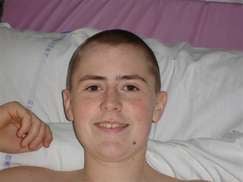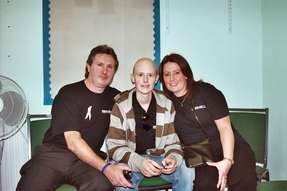
DSRCT is a particularly aggressive type of sarcoma that occurs mostly in adolescent and young people. It is very difficult to treat and currently has a poor prognosis.
Through Rob’s ARTTT, Amanda, along with Rob’s dad, Chris, and other friends and family, have been working tirelessly to meet Rob’s wish. Their hope is that other teenagers have a better chance against this very aggressive disease.
Amanda says: “The charity is the only positive thing to losing our child. I can’t give up, I have to keep going. Rob was so brave, he is my hero and we have come a long way in 10 years.”
Developing better cancer treatments

Due to its rarity, DSRCT is studied by very few scientific research groups. Progress in understanding its biology is generally behind that of other types of cancer, which has hindered the development of new therapies.
However, in the past several years there have been treatments developed that show promising results, with many patients experiencing complete remissions sustained for longer than two years.
Rob’s ARTTT is committed to finding a cure for teenage cancer, and they have raised over £240,000 for DSRCT research to date. Their generous donations are funding a team of scientists at the ICR to develop better cancer treatments with fewer side-effects.
Changing the delivery of cancer care
The team is guided by Professor Janet Shipley – one of the world’s leading experts on soft-tissue sarcomas. She is trying to gain insights into DSRCT by unravelling what triggers it and understanding its biology.
The ultimate aim of this research is to change delivery of cancer care for children and teenagers with DSRCT, by starting to build robust knowledge of genetic changes that occur in this disease - and which can be targeted using drugs already in clinical use.
Learn more about Professor Shipley’s research at the ICR.